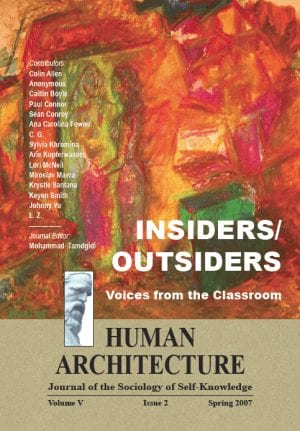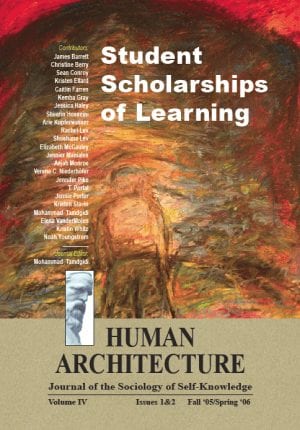Journal Article — Looking Inside Out: A Sociology of Knowledge and Ignorance of Geekness — by Johnny Yu
$15.00
Geek. Nerd. Dork. Outsider. Anti-social. Outcast. Non-mainstream. No life. All of these words have been used to describe me, and all of them are true to some degree. These are terms used for people who have interests that are outside of popular culture. I open this discussion by first looking at myself.
Description
Abstract
“Looking Inside Out: A Sociology of Knowledge and Ignorance of Geekness” is authored by Johnny Yu.
“Geek. Nerd. Dork. Outsider. Anti-social. Outcast. Non-mainstream. No life. All of these words have been used to describe me, and all of them are true to some degree. These are terms used for people who have interests that are outside of popular culture.
“When a person falls out of the “in” group due to different interests, whether it be from liking things that the dominant group does not approve of or from not liking things that the dominant group likes, he gets branded with one (or all) of the above terms. This categorization is a way to separate the insiders and the outsiders, and a hierarchy is established.
“It is obvious that the outsiders are at the bottom of that arrangement, since all of the terms used to describe them bear a negative connotation. I open this discussion by first looking at myself. I do this because, according to the works of G.I. Gurdjieff, the process of knowing has to start with self-awareness. “The only person who can know myself is myself … no amount of fantasizing about who or what I am will substitute for a direct, dispassionate look at the data” (Speeth). To look at this with such a narrow scope is not good enough, however.
“The problem of separating popular and geek culture lies far beyond just me or the groups of people I associate with. I move on then to gain a better understanding of the situation by reading the work of Elizabeth Minnich. She explains how divisions have formed, and how groups are excluded.
“This exclusion is necessary so that the dominant group can de-legitimize all other groups. The root of our problems with knowledge is that we have separated people into groups, or “kinds,” as she calls them, and then taken the words of one group as having more significance than all other groups.
“Minnich goes on to explain that the root problem has led to errors in the way that we construct knowledge, and that there are four main areas where errors occur. She calls them faulty generalization, circular reasoning, mystified concepts, and partial knowledge.
“The four errors have a tendency to overlap, and they perpetuate each other as well as perpetuate the root problem itself. Looking inside out, and drawing upon Gurdjieff and Minnich, I then try to develop a sociological approach to the knowledge and ignorance of geekness.”
Recommended Citation
Yu, Johnny. 2007. “Looking Inside Out: A Sociology of Knowledge and Ignorance of Geekness.” Pp. 41-50 in Insiders/Outsiders: Voices from the Classroom (Human Architecture: Journal of the Sociology of Self-Knowledge: Volume V, Issue 2, 2007.) Belmont, MA: Okcir Press (an imprint of Ahead Publishing House).
The various editions of Insiders/Outsiders: Voices from the Classroom can be ordered from the Okcir Store and are also available for ordering from all major online bookstores worldwide (such as Amazon, Barnes&Noble, and others).




